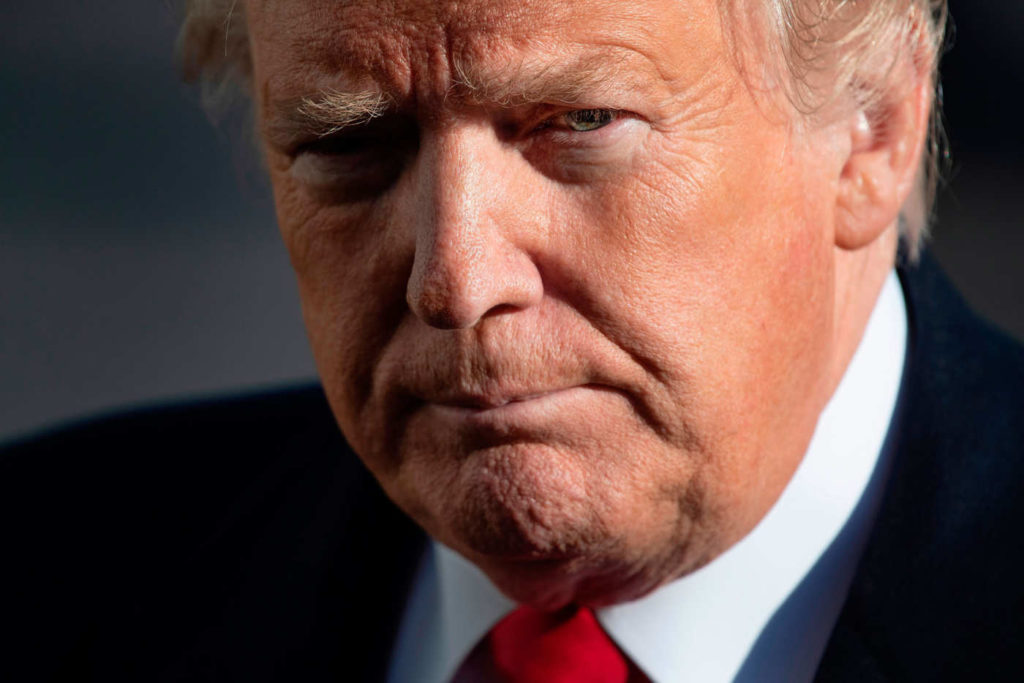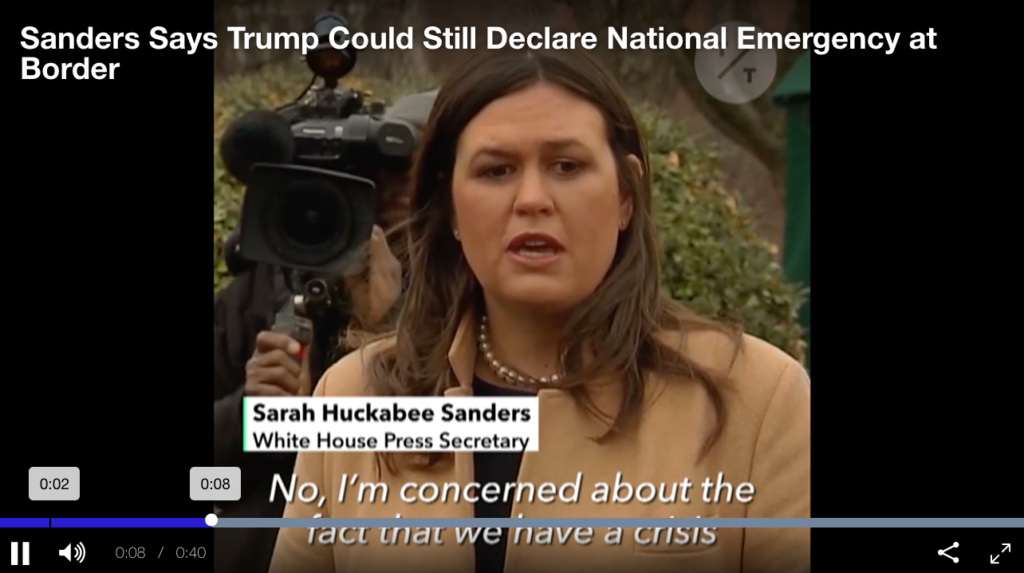Declaring A National Emergency Could Give Trump Authority To Shutdown Your Bank Account (#GotBitcoin?)

For some time now President Trump has been publicly and privately mulling the idea of using a national emergency declaration to give him the power to redirect Pentagon funds to replace the border-wall appropriations Congress has denied him. This idea clearly began as a way for Trump to get out of the trap he set for himself by stumbling into a government shutdown over his border-wall demands. It’s now something that could happen as soon as tonight’s Oval Office address prior to a presidential trip to the U.S.–Mexico border.Declaring A National Emergency Could Give Trump Authority To Shutdown Your Bank Account

Since very few people outside the White House or the nativist fever swamps of the far right think the situation on the southern border represents a “national emergency,” this talk has been largely derided as an absurd overreach by a president whose understanding of the limits of his powers has always been shaky at best, and as a laughably indirect way of obtaining a purely symbolic goal. But it’s beginning to dawn on official Washington that it’s a gambit Trump might well successfully pull off, with possible implications that go far beyond building a concrete or steel wall.
In the 20th century, Congress regularly gave presidents a wide variety of powers deemed necessary to executive functions during a national emergency, real or contrived. Such emergencies were, among other things, the legal basis for America’s undeclared wars in Korea and Vietnam. In order to regularize these incidents and provide for their termination (there were at the time 470 declarations theoretically still in force), Congress passed a National Emergencies Act in 1976. As the Wall Street Journal . explains, once a president declares an emergency, all sorts of expanded powers may become available:
The National Emergencies Act doesn’t outline specific powers. Instead, those are laid out in hundreds of specific statutes that give the president extra leeway in a declared emergency. For instance, the International Emergency Economic Powers Act authorizes the president to block financial transactions or freeze assets in response to foreign threats.
In November, for example, Mr. Trump declared that Nicaraguan President Daniel Ortega’s campaign to suppress political opposition constituted such a threat, and he froze the assets of individuals involved in stifling protests against the Ortega regime.
Most national emergencies have been similarly narrow, such as a 2001 declaration prohibiting the importation of rough diamonds from Sierra Leone, where they were used to fund a brutal civil war. That declaration was revoked in 2004 as the war ended.
An exception came three days after the Sept. 11, 2001, terrorist attacks, when President Bush declared a national emergency that has been renewed ever since, most recently by Mr. Trump.
What Trump has in mind are two statutes that allow redirection of military construction funds during a declared national emergency. There are all sorts of questions as to whether building a border wall is actually a military construction project, and additional questions about the sufficiency of any presidential power to declare eminent domain over private property needed for a border wall. But no one doubts that Trump can make the initial declaration whenever he wants. And barring some congressional action to veto or terminate the declaration (which would require a two-thirds votes in both Houses), the only thing restraining him might be the courts, which have traditionally been very lenient in affording the president broad emergency powers. It’s not even clear who, if anyone, would have legal standing to challenge such a declaration with a lawsuit.
But totally aside from its impact on the border-wall dispute and the government shutdown, a Trump national emergency declaration could open the door to all the other emergency powers Congress has given the president over the decades. As Elizabeth Goitein of the Brennan Center for Justice recently pointed out, these powers are extensive and potentially authoritarian:
The moment the president declares a “national emergency” — a decision that is entirely within his discretion — more than 100 special provisions become available to him. While many of these tee up reasonable responses to genuine emergencies, some appear dangerously suited to a leader bent on amassing or retaining power. For instance, the president can, with the flick of his pen, activate laws allowing him to shut down many kinds of electronic communications inside the United States or freeze Americans’ bank accounts.
Previously unutilized (or narrowly utilized) emergency powers could take on a whole new dimension under a president like Trump, who is so willing to exaggerate threats to national security and has no real respect for the rule of law if it inconveniences him. Goitein lays out a nightmare scenario in which a propaganda war with Iran leads to all sorts of domestic repercussions once a national emergency has been declared:
Unfazed by his own brazen hypocrisy, he tweets that Iran is planning a cyber operation to interfere with the 2020 election. His national-security adviser, John Bolton, claims to have seen ironclad (but highly classified) evidence of this planned assault on U.S. democracy. Trump’s inflammatory tweets provoke predictable saber rattling by Iranian leaders; he responds by threatening preemptive military strikes. Some Defense Department officials have misgivings, but others have been waiting for such an opportunity. As Iran’s statements grow more warlike, “Iranophobia” takes hold among the American public.
Proclaiming a threat of war, Trump invokes Section 706 of the Communications Act to assume government control over internet traffic inside the United States, in order to prevent the spread of Iranian disinformation and propaganda. He also declares a national emergency under the [International Emergency Economic Powers Act], authorizing the Treasury Department to freeze the assets of any person or organization suspected of supporting Iran’s activities against the United States. Wielding the authority conferred by these laws, the government shuts down several left-leaning websites and domestic civil-society organizations, based on government determinations (classified, of course) that they are subject to Iranian influence. These include websites and organizations that are focused on getting out the vote.
This may seem far-fetched politically, but legally, an emergency declaration is the sort of thing that opens the door to abuses by a White House in internal crisis that seeks an external crisis to rally public support and clamp down on critics. And that’s the road we could begin taking as a country even if Trump’s resort to an emergency declaration is initially nothing more than an avenue out of a blind alley the president entered when he lost his temper and shut down the government.
Updated: 1-09-2019
Trump Still Considering Emergency Declaration, White House Says
President Donald Trump’s administration is still considering declaring a national emergency on the U.S.-Mexico border as a government shutdown over his proposed wall stretches on, White House Press Secretary Sarah Huckabee Sanders said.
“It’s something we’re still looking at,” Sanders told reporters Wednesday morning. “The best solution is to be able to work with Congress to get this done. We can close a lot of the loopholes, fund border security fully and that’s what we’re hopeful to do.”
Sanders also told Fox News on Wednesday that declaring the emergency was “certainly still an option.”
Trump, in a prime-time address from the Oval Office on Tuesday night, reiterated his claims that people and drugs entering the country illegally across its southern border are responsible for committing crimes and that a wall would help thwart them. In a Democratic rebuttal, House Speaker Nancy Pelosi and Senate Minority Leader Chuck Schumer demanded the president first end the shutdown, then discuss border security. None offered new options to end the impasse.
With little hope of a breakthrough in negotiations — and the shutdown now in it’s 19th day — Fitch Ratings Ltd. warned Wednesday of a possible cut to the U.S. triple-A sovereign credit rating later this year, according to Reuters.
Updated 1-25-2019
White House Preparing Draft National Emergency Order, Has Identified $7 Billion For Wall
The White House is preparing a draft proclamation for President Donald Trump to declare a national emergency along the southern border and has identified more than $7 billion in potential funds for his signature border wall should he go that route, according to internal documents reviewed by CNN.
Trump has not ruled out using his authority to declare a national emergency and direct the Defense Department to construct a border wall as Congress and the White House fight over a deal to end the government shutdown. But while Trump’s advisers remain divided on the issue, the White House has been moving forward with alternative plans that would bypass Congress.
“The massive amount of aliens who unlawfully enter the United States each day is a direct threat to the safety and security of our nation and constitutes a national emergency,” a draft of a presidential proclamation reads.
“Now, therefore, I, Donald J. Trump, by the authority vested in me by the Constitution and the laws of the United States of America, including the National Emergencies Act (50 U.S.C 1601, et seq.), hereby declare that a national emergency exists at the southern border of the United States,” the draft adds.
The draft was updated as recently as last week, a US government official told CNN.
According to options being considered, the administration could pull: $681 million from Treasury forfeiture funds, $3.6 billion in military construction, $3 billion in Pentagon civil works funds, and $200 million in Department of Homeland Security funds, the official said.
As lawmakers discussed a short-term measure to fund the government Thursday, Trump again raised the prospect of other ways to fund a border wall without congressional approval.
“I have other alternatives if I have to and I’ll use those alternatives if I have to,” he told reporters.
“A lot of people who wants this to happen. The military wants this to happen. This is a virtual invasion of our country,” Trump said.
The Defense Department referred a request for comment from CNN to the White House.
If the declaration is made, the US Army Corps of Engineers would be deployed to construct the wall, some of which could be built on private property and would therefore require the administration to seize the land, which is permitted if it’s for public use.
The administration’s plans acknowledge the possibility for lawsuits if they move forward with acquiring private property. The documents also reflect a sense of urgency with administration plans, noting that environmental reviews can be skipped and DHS can use waivers to bypass contracting laws.
If the President proceeds with the declaration, it’ll likely be challenged in court and by Democrats in Congress, as critics have argued that Trump cannot use the national emergency authority to free up taxpayer funds and build the border wall he has long promised his political supporters.
The question of legality and court challenges is still one of the main hang-ups in using executive action to secure the wall funding. Trump’s advisers have cautioned that taking that route would lead to certain legal challenge, meaning the wall construction would still be delayed.
The draft document cites Title 10 of the US Code, which allows Trump to unlock a stash of Pentagon funds that are earmarked but have no signed contracts for spending that money. That would give the President authority to pull from military construction funds and civil works projects, like infrastructure repair projects.
Rep. Dan Crenshaw, R-Texas, tweeted earlier this month that acting White House Chief of Staff Mick Mulvaney, “assured Texans that he understood the deep concerns about using Harvey relief funds for the border.” CNN previously reported that the Pentagon was asked to provide a list of those projects in anticipation of a national emergency.
The Pentagon has assisted the Department of Homeland Security in the past. For example, the Army Corps of Engineers, a federal agency within DOD that provides public engineering services, has helped evaluate prototypes of the border wall.
Options under consideration conceded that acquiring private property would take time. Even if voluntary, the land could take up to a year to be acquired. Land condemnation cases are known to take time because property owners have the right to sue. A national emergency declaration would not speed that process up, a government official says.
Customs and Border Protection has said that it would consider eminent domain in the future.
“It is always CBP’s preference to acquire property through a voluntary, negotiated sale. The Government will attempt to negotiate an offer to sell using survey data and value estimates gleaned from the surveying process,” reads an excerpt in a border wall Q&A on their site. “The Government will attempt to negotiate an offer to sell before moving forward with exercising eminent domain. However, if the Government and landowner are unable to reach a negotiated sale or if the Government is unable to obtain clean title, the Government will need to file an eminent domain action.”
Related Articles:
Trump Administration’s ‘Plunge Protection Team’ Convened Amid Wall Street Rout (#GotBitcoin?)
US Treasury Secretary Steven Mnuchin Tries Calm Banks, Panicked Stock Markets, Trump Completely Silent (#GotBitcoin?)
Trump Policies Cause Chinese Stocks To Out-perform Those of US. (#GotBitcoin?)
Mitt Romney Blasts ‘Deep Descent’ of Trump Presidency (#GotBitcoin?)
Your questions and comments are greatly appreciated.
Monty H. & Carolyn A.


Leave a Reply
You must be logged in to post a comment.